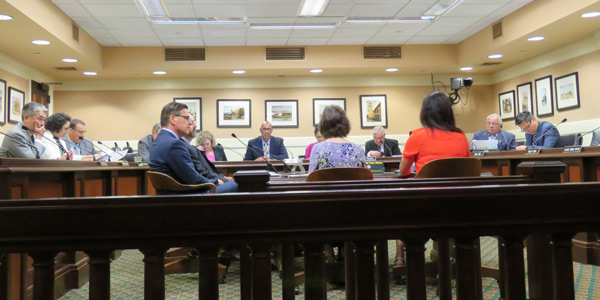By Jason Fordney
SACRAMENTO, Calif. — California utilities and business groups are opposing a proposed state law that would increase the amount of publicly available data about electricity consumers, saying it presents a major risk to physical grid security.
But environmental groups and others support the energy data transparency bill (SB 356) because it would allow customers to better manage their data and provide them more visibility into grid operations, reducing barriers to participation in energy efficiency and other programs.
The State Assembly Committee on Utilities and Energy on Wednesday passed the Democrat-sponsored bill along party lines. Committee members added amendments that require customer permission to release information and direct the California Public Utilities Commission to determine exactly what information should be released.
The bill, approved by the State Senate in May in a 25-13 vote, will move to the Assembly Appropriations Committee before going back to the Senate for another vote.
The bill’s sponsor defended the bill, which has also drawn opposition from business and public interest groups representing Latinos and African-Americans.
“The fact that some folks assert these privacy issues — whether it is a fact or an assertion are two different things,” Sen. Nancy Skinner (D) said during the hearing. The bill as amended allows the PUC to factor in security and privacy when evaluating what data are to be made public, she said. Skinner added that the measure would “clearly communicate” to the PUC that the legislature supports usage of anonymized data to enable a more efficient and lower-cost electricity grid.
Several technology and environmental groups support the bill, saying it would point to areas on the system where distributed energy resources or clean energy technology could be deployed.
The bill requires the PUC to make capacity, distribution infrastructure and pricing data available to the public in a machine-readable format on the Internet by Jan. 1, 2019. The data would include energy data submitted to the agency as part of utilities’ integrated resource plans, descriptions of grid needs or deficiencies, and electricity pricing data. It requires each retail seller of electricity and publicly owned utility to track energy usage for each building in their service territories.
But representatives from California utilities said the bill would provide specific device and setting information that would allow bad actors to physically attack infrastructure. Other disclosed information has the potential to enable people to disable devices on the grid, said John Baranowski, electric distribution planning manager for San Diego Gas & Electric.
“The most concerning aspects of this bill are the implications for grid and cybersecurity,” Baranowski said. The utility supplies military bases and the Port of San Diego, “and all of these customers could be exposed to potential risk” if the data are published, he said, especially the more precise data on customer load and physical system information. He added that the bill duplicates other PUC efforts, and that there is already plenty of data available on potential DER installations.
Representatives from Pacific Gas and Electric and Southern California Edison also opposed the bill, expressing concern about physical security of infrastructure. The bill would also increase information technology costs to be passed on to ratepayers.
Assembly member Brian Dahle (R) suggested that third-party data companies are pushing the proposal so they can obtain information that energy companies collect about their customers.
“If you were that third party, you could then target their customers, and that is what I see this doing,” Dahle said. He questioned the need for the bill given existing programs.
Skinner said it is currently an onerous process for building owners to get certain electricity data and know whether to invest in energy control or efficiency. The bill streamlines the process for tenants to get data to building owners, and ratepayer advocates could also use the data to benefit consumers, she said.
The committee passed the bill on a 9-4 vote, with Dahle and Autumn Burke (D) abstaining. Committee Chairman Chris Holden (D) voted in favor, saying the amended bill put adequate customer protections in place.





